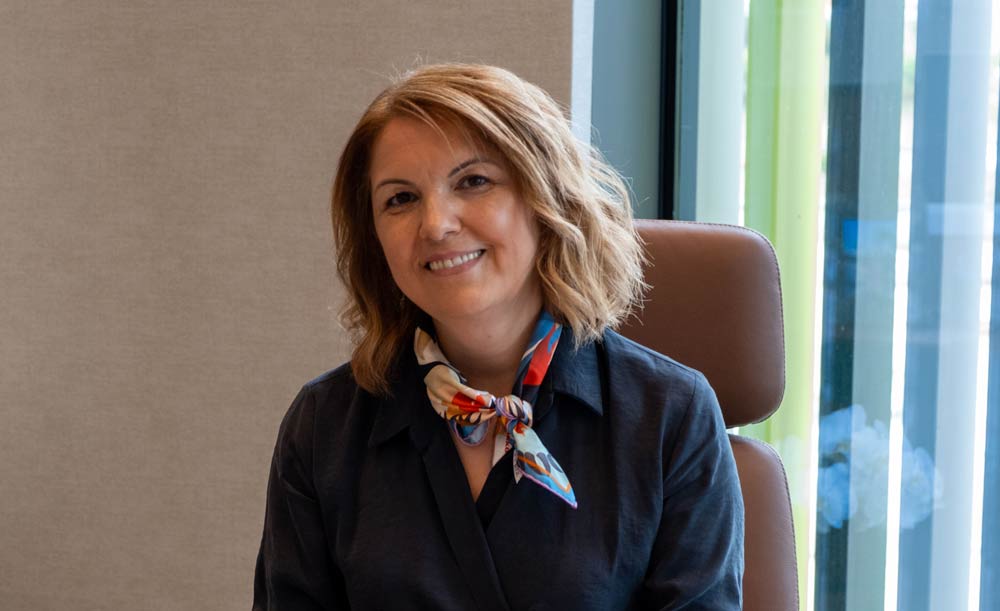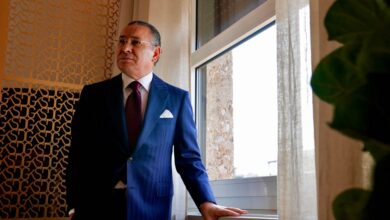Mrs. Serpil Sarıaydın
Director of ACIBADEM ATASEHIR HOSPITAL, ACIBADEM's 10th hospital in Istanbul and 24th worldwide
“Every year, we welcome around 2540 patients from Middle Eastern countries, primarily seeking oncology treatments, cardiovascular surgeries, neurosurgical treatments, IVF, pediatrics care, as well as aesthetic procedures and annual health check-ups”
ACIBADEM Healthcare Group operates a network of hospitals across 5 countries: Turkey, Bulgaria, Macedonia, Serbia, and the Netherlands. It all began in 1991 when the Group opened its first hospital in Istanbul, becoming a dominant provider of private healthcare services in Turkey. The growth of ACIBADEM has been remarkable. Less than a year ago, the Group inaugurated its newest hospital, ACIBADEM Ataşehir, marking its 10th hospital in Istanbul and 24th globally. As the latest jewel in its “hospotel” chain, ACIBADEM Ataşehir stands out for its innovative architecture, cutting-edge medical technology, and exclusive digital systems tailored for health management. Notably, its pediatrics department boasts a child-friendly design and separate play areas, distinct from the main hospital building. Mrs Serpil Sarıaydın, an influential female hospital director within ACIBADEM Group, was entrusted with the mission of making ACIBADEM Ataşehir Hospital a global flagship. Leading the team managing this state-of-the-art facility with 153 suites of varying standards, 298 beds, 10 operating theaters, and specialized rooms for procedures like IVF, minor surgeries, angiography, endoscopy, and colonoscopy.
Could you introduce yourself, Mrs. Sarıaydın?
Born in 1976 in Kocaeli, Turkey, I embarked on my journey in Hospital Management at Hacettepe University in 1994, completing my studies in 1998. I pursued further studies in Business Administration at Kocaeli University. Following that, I spent 7 years in the public sector before joining ACIBADEM Healthcare Group in 2005. Since then, I’ve been serving as a Hospital Director within the same group for 18 years.
Leaving the public sector to join ACIBADEM at a time when it was a smaller entity was a significant decision. Do you remember your first day at ACIBADEM?
Drawing from my public sector experience, I was relatively calm on my first work day at ACIBADEM. However, as I entered the hospital, it felt like the start of a new phase, reminiscent of my first professional venture after completing my education. The public hospital where I previously worked was enormous, with 600 beds, following the Health Ministry’s management guidelines. ACIBADEM’s setup was more akin to hotels than hospitals, with meticulous procedures and a strong focus on quality and safety standards. ACIBADEM aimed for global competition, and it truly provides an exceptional learning environment.
What’s your perspective on the impact of women in leadership roles in the healthcare sector?
In Istanbul, where ACIBADEM operates 10 hospitals, 8 women are holding the position of Hospital Director. Regardless of gender, ACIBADEM Hospital Directors deliver outstanding results, a testament to the high managerial standards set by ACIBADEM Group. Men and women exhibit remarkable professionalism at all levels, yet I believe that women’s precision, sense of responsibility, attention to detail, maternal instincts, and inherent compassion allow us to excel uniquely.
Could you describe your relationship with the doctors in your hospital?
While all hospital staff adhere to traditional work terms, our doctors are seen as partners. They determine their work hours and schedules, offering them more autonomy compared to traditional employment. We aim to create a workplace where doctors can operate comfortably and efficiently, free from psychological and financial pressures that might arise from complete independence. This way, our doctors can focus solely on delivering the best medical care. Patients are central in ACIBADEM’s structure, cared for by medical staff supported by administrative teams.\

What services are available to local and international patients?
From ACIBADEM’s standpoint, all patients receive equal treatment and services. However, international patients, often unfamiliar with their surroundings, are more vulnerable. We extend additional empathy and take care to reduce any psychological stress. We’ve established a dedicated department catering to international patients, offering services from airport pickup to direct communication with translators and doctors via personal phones. We view our role as hosts for patients rather than tourists, treating them with utmost care.
Which medical specialties are frequently sought by patients from Middle Eastern countries?
International patients at ACIBADEM consult a range of departments. We offer regional representatives who facilitate second medical opinions in patients’ native languages. Many of these patients ultimately choose ACIBADEM for treatment. We excel in various medical branches, utilizing cutting-edge technology and offering treatments 40-45% more cost-effective than in Europe. Our hospitals cover a wide array of medical fields. Patients coming from the Middle-East frequently seek oncology treatments, cardiovascular surgeries, neurosurgical treatments, IVF, pediatrics care, as well as aesthetic procedures and annual health check-ups.
Why should patients from Middle Eastern countries consider Turkey for medical tourism, particularly ACIBADEM Ataşehir Hospital?
Turkey and the Middle Eastern countries share common cultural aspects, influenced by their geopolitical positions. Our shared characteristics, including religion, traditions, and hospitality, foster a sense of familiarity. No travel restrictions between our countries further facilitate visits. Safety is paramount in our hospitals. We ensure quality measures are maintained across operating theaters, consultation rooms, laboratories, and patient rooms. Our relationship with patients is transparent, and we prioritize their well-being. ACIBADEM Ataşehir Hospital, launched in September 2022, was meticulously prepared to provide top-notch care. With a seasoned management team and a well-trained staff, we successfully managed hundreds of consultations and surgeries during the first week of operation.
What advice would you offer to the next generation of female leaders?
As a female leader, I take pride in my role and my ability to balance responsibilities and expectations from various stakeholders. Balancing professional and personal obligations is crucial. Striving for success requires maintaining one’s feminine qualities, including emotional intelligence, empathy, and compassion. These attributes, driven by our female hormones, distinguish us and contribute to our achievements. My advice to current and future female managers is to embrace their feminine instincts, as these qualities define our unique leadership approach. In Turkey, there’s a saying praising a woman’s success “like a man” Yet, women should remain true to their inherent strengths and not imitate masculine behavior to succeed.

During your leisure time, if you have any, how do you unwind?
Though work is demanding, I find solace in traveling. Recently, I visited Morocco, a short 4-day trip. My sister and I explored various cities, soaking in Morocco’s history, culture, and local cuisine. The warmth of the people left a lasting impression. My interest in writing led me to creative writing classes and specializing in children’s stories. Morocco, in particular, was inspiring for my writing endeavors.
It’s a country I’d return to annually, with curiosity about new recommendations from my Moroccan patients. While I’ve traveled extensively, Morocco stands out. Despite typically not revisiting countries, I would happily return to Morocco each year. This sentiment is testament to Morocco’s uniqueness among the countries I’ve visited. I believe every country in the Middle East and North Africa is worth at least one visit in a lifetime.















